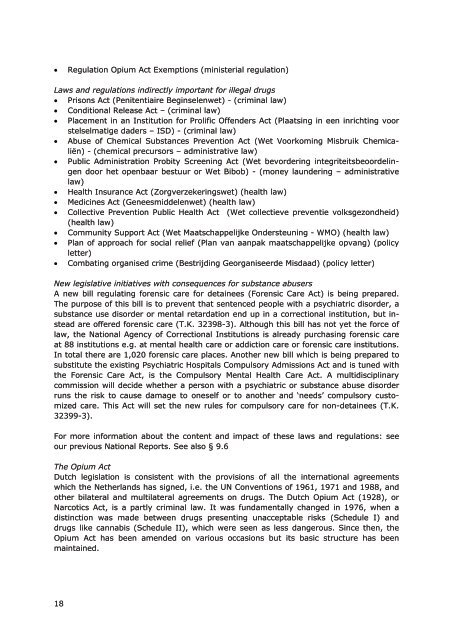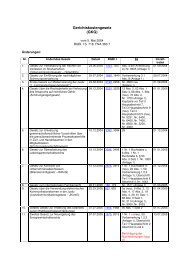The Netherlands Drug Situation 2010 - Trimbos-instituut
The Netherlands Drug Situation 2010 - Trimbos-instituut
The Netherlands Drug Situation 2010 - Trimbos-instituut
You also want an ePaper? Increase the reach of your titles
YUMPU automatically turns print PDFs into web optimized ePapers that Google loves.
Regulation Opium Act Exemptions (ministerial regulation)Laws and regulations indirectly important for illegal drugs Prisons Act (Penitentiaire Beginselenwet) - (criminal law) Conditional Release Act – (criminal law) Placement in an Institution for Prolific Offenders Act (Plaatsing in een inrichting voorstelselmatige daders – ISD) - (criminal law) Abuse of Chemical Substances Prevention Act (Wet Voorkoming Misbruik Chemicaliën)- (chemical precursors – administrative law) Public Administration Probity Screening Act (Wet bevordering integriteitsbeoordelingendoor het openbaar bestuur or Wet Bibob) - (money laundering – administrativelaw) Health Insurance Act (Zorgverzekeringswet) (health law) Medicines Act (Geneesmiddelenwet) (health law) Collective Prevention Public Health Act (Wet collectieve preventie volksgezondheid)(health law) Community Support Act (Wet Maatschappelijke Ondersteuning - WMO) (health law) Plan of approach for social relief (Plan van aanpak maatschappelijke opvang) (policyletter) Combating organised crime (Bestrijding Georganiseerde Misdaad) (policy letter)New legislative initiatives with consequences for substance abusersA new bill regulating forensic care for detainees (Forensic Care Act) is being prepared.<strong>The</strong> purpose of this bill is to prevent that sentenced people with a psychiatric disorder, asubstance use disorder or mental retardation end up in a correctional institution, but insteadare offered forensic care (T.K. 32398-3). Although this bill has not yet the force oflaw, the National Agency of Correctional Institutions is already purchasing forensic careat 88 institutions e.g. at mental health care or addiction care or forensic care institutions.In total there are 1,020 forensic care places. Another new bill which is being prepared tosubstitute the existing Psychiatric Hospitals Compulsory Admissions Act and is tuned withthe Forensic Care Act, is the Compulsory Mental Health Care Act. A multidisciplinarycommission will decide whether a person with a psychiatric or substance abuse disorderruns the risk to cause damage to oneself or to another and ‘needs’ compulsory customizedcare. This Act will set the new rules for compulsory care for non-detainees (T.K.32399-3).For more information about the content and impact of these laws and regulations: seeour previous National Reports. See also § 9.6<strong>The</strong> Opium ActDutch legislation is consistent with the provisions of all the international agreementswhich the <strong>Netherlands</strong> has signed, i.e. the UN Conventions of 1961, 1971 and 1988, andother bilateral and multilateral agreements on drugs. <strong>The</strong> Dutch Opium Act (1928), orNarcotics Act, is a partly criminal law. It was fundamentally changed in 1976, when adistinction was made between drugs presenting unacceptable risks (Schedule I) anddrugs like cannabis (Schedule II), which were seen as less dangerous. Since then, theOpium Act has been amended on various occasions but its basic structure has beenmaintained.18




